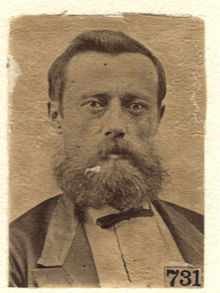John Bates Thurston
|
Sir John Bates Thurston KCMG FRGS |
|
|---|---|
 |
|
| Acting Premier of the Kingdom of Viti | |
|
In office 23 March 1874 – 10 October 1874 |
|
| Monarch | Seru Epenisa Cakobau |
| Preceded by | George Austrin Woods |
| Succeeded by | none (position abolished) |
| Acting High Commissioner for the Western Pacific | |
|
In office 21 January 1885 – 1 January 1887 |
|
| Monarch | Victoria |
| Preceded by | Sir William Des Vœux |
| Succeeded by | Sir Charles Mitchell |
| Acting Governor of Fiji | |
|
In office 21 January 1885 – 1 January 1887 |
|
| Monarch | Victoria |
| Preceded by | Sir William Des Vœux |
| Succeeded by | Sir Charles Mitchell |
| 4th High Commissioner for the Western Pacific | |
|
In office 1888–1897 |
|
| Monarch | Victoria |
| Preceded by | Sir Charles Mitchell |
| Succeeded by | Sir George O'Brien |
| 5th Governor of Fiji | |
|
In office 1888–1897 |
|
| Monarch | Victoria |
| Preceded by | Sir Charles Mitchell |
| Succeeded by | Sir George O'Brien |
| Personal details | |
| Born | 31 January 1836 London, United Kingdom |
| Died | 7 February 1897 (aged 61) Suva, Fiji |
| Resting place | Melbourne General Cemetery |
| Citizenship | British |
| Spouse(s) | Madame de Lavalatte Amelia Berry 14 January 1883 - 7 February 1897 (his death) |
| Children | 3 sons, 2 daughters |
Sir John Bates Thurston KCMG FRGS (31 January 1836 – 7 February 1897) was a British colonial official who served Fiji in a variety of capacities, including Premier of the Kingdom of Viti (before the islands were ceded to the United Kingdom) and later as colonial Governor.
Thurston was born on 31 January 1836 in London, England, where he received an elementary education before pursuing a nautical career in 1850. In 1855 he became first officer, but shortly afterwards was struck down by cholera and was sent to Australia to recover. He became a sheep farmer with a friend, but in 1862 the farm was destroyed by a flood. In 1864, he joined a botany expedition to the South Sea Islands and was wrecked off the coast of Samoa, where he was stranded for eighteen months, before being rescued and brought to Fiji.
Shortly after his arrival in Fiji he was employed by the British Consulate. In 1869 he became acting Consul for Fiji and Tonga.
In June 1871, Thurston, then Britain's honorary consul, forged a "marriage of convenience" between the Bauan chief Seru Epenisa Cakobau and the British settlers. He persuaded the Fijian chiefs to surrender the independence of their fiefdoms and accept a constitutional monarchy with Cakobau as King, but with real power in the hands of a cabinet and legislature dominated by settlers. The arrangement was not particularly successful. Within months, government overspending had led to the accumulation of an unmanageable debt which led to economic and social unrest.
...
Wikipedia
